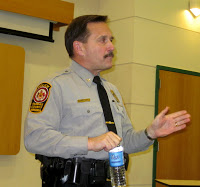FX CO Police Chief Rohrer says public trust is essential to law enforcement
 |
| Rohrer |
Fairfax County Police Chief David Rohrer does not believe the police should ask people about their citizenship status during routine law enforcement matters, he told members of the Mason District Station Citizens Advisory Committee Tuesday evening.
“Public trust is what we base everything we do on,” he says. Noting that he has heard from people who say they won’t call the police if they are robbed if they fear they might be deported, Rohrer says he believes “police officers should not be engaged with everyday enforcement of immigration law.”
“Behavior is different,” he says. If someone commits a serious crime—such as being involved with gang recruitment—“we can work with ICE” (U.S. Immigration and Customs Enforcement). And if someone is arrested and goes to jail, questions about citizenship are appropriate as part of the booking process, but he says the police will not bring ICE to deal with something like day laborers.
With regard to the Citizens Coalition for Police Accountability’s recommendation for a citizen review panel on police misconduct, Rohrer says he is “open to having an independent review of some type. I have nothing to hide.” He would prefer an auditor within the county government, rather than a citizens panel, however.
The coalition argues that more transparency is needed because “there appears to be a few officers who practice abuse of power, arrogance of power, and lack of respect toward the citizens they serve.” The group’s website lists cases where officers were not prosecuted for accidentally killing innocent citizens.
Rohrer has been with the Fairfax County Police for 30 years, including a seven-year stint on the SWAT team. The Citizens Advisory Committee meets monthly at the Mason District Government Center to talk about local crime and police issues and how community members can support the police.
Rohrer told the committee that, despite the economic downturn, the crime rate (for seven major crimes) was down 7.5 percent from 2009 to 2010.
People think crime goes up during hard times, he says, “but just because someone lost their job, it doesn’t mean they’re going to rob a bank or turn to crime.” But he does think domestic violence and suicide are linked to economic troubles.
“We have a very safe community,” he says, and Fairfax County has one of the lowest crime rates in the country. In a county with a population of 1 million people, there are an average of 16 murders a year.
But there are about 2,500 reported cases of domestic violence. “That to me is an outrage,” he says. There are probably a lot more cases that go unreported, because victims are afraid the abuser will go to jail or be deported.
While having a diverse community is a plus, it presents a challenge for police investigating incidents involving immigrants who don’t speak English, Rohrer says. He would like to see a more diverse police force, but it’s been difficult recruiting people from countries where the police are not seen in a positive light.
He also would see a lot more attention paid to underage drinking. “It’s not just about a few beers. Young people are getting drunk as hard and as fast as they can.” In some cases, they are pouring vodka into their eyeballs to get intoxicated more quickly, he says. “They are getting killed and they’re dying. This is real.”
The biggest issue for the police right now is the budget, Rohrer says. The department has gone through significant budget reductions, 15 percent, in the last two to three years, and “we had to prioritize what matters most.”
Areas where Rohrer says he won’t cut are the men and women who patrol the streets, the SWAT team, the bomb squad, and other direct operations. Where cuts have been made are in areas that are still important, but less critical, he says, such as education and prevention. The school resource officers stationed at middle and high schools had been on the chopping block but were saved by the Board of Supervisors last year.
No real cuts are proposed for 2012, Rohrer says, but no real increases are expected either. He predicts “slow moderate growth going forward,” with an increase of about 1 percent.
But that doesn’t include pay increases, and this will be the third year in a row without raises for police officers. “It’s time to restore something for them,” Rohrer says.

